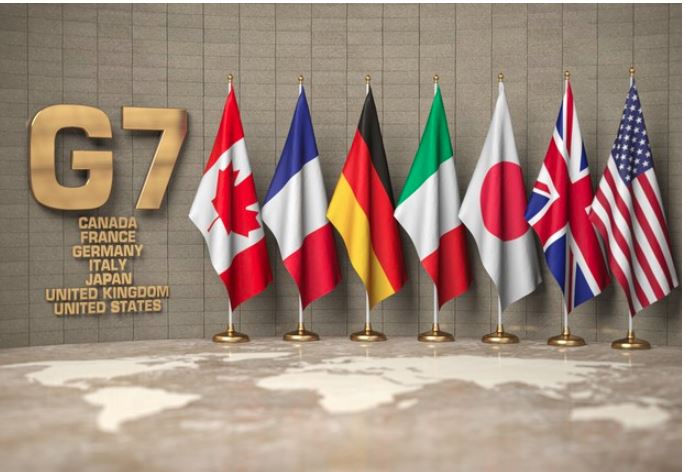Context
Recently, the group of seven advanced economies (G7) agreed to implement a price cap on oil exports from Russia at a virtual meeting of their Finance Ministers.

Key-Points
- Motive of the move: Cutting off a source of financing for Russia as its invasion of Ukraine continues.
- With London being a major global centre for maritime insurance, the plan hinges on denying shipping to oil above the price cap.
- Group implementation: It is a joint political intention to finalize and implement a comprehensive prohibition of services which enable maritime transportation of Russian-origin crude oil and petroleum products globally.
- Price Capping: The actual ceiling price is not yet decided.
- The G7 has invited all countries to provide input.
- The initial price cap will be based on a range of technical inputs and revisited subsequently as required.
- Reason for Capping: To limit Russia from profiting from its war of aggression while limiting the impact on global energy prices.
- Inflation is already high globally as well as in most of the G7 countries.
- Those involved in delivering Russian seaborne petroleum and petroleum products will be permitted to provide services if the price is below or at the cap.
- Challenge in the implementation: For the price caps to work, India and China will likely need to be involved.
- Although India has purchased Russian oil at low or discounted prices after the invasion of Ukraine, with the government defending the move on grounds of national interest.
- Expected move: The G7 is aiming to align the timing of the price cap with an EU ban on seaborne imports of crude oil from Russia and a petroleum products embargo.
About Group of Seven (G7)
- It is an intergovernmental organisation of seven countries that are the world’s most industrialized and developed economies.
- It does not have a formal constitution or a fixed headquarters and the decisions taken by leaders during annual summits are non-binding.
- Together the member countries represent 40% of global GDP and 10% of the world’s population.
- Unlike other bodies such as NATO, the G7 has no legal existence, permanent secretariat or official members.
- It also has no binding impact on policy and all decisions and commitments made at G7 meetings need to be ratified independently by governing bodies of member states.
- Present Members:
- France, Germany, United Kingdom, Italy, United States of America, Canada and Japan.
- Genesis:
- It traces its origin to an informal meeting of the Finance Ministers of France, West Germany, the US, Great Britain and Japan (Group of Five) in the wake of the 1973 oil crisis.
- Canada joined the group in 1976 and the European Union (EU) began attending the meetings from 1977.
- It was called the G8 after the original seven were joined by Russia in 1997 and it returned to being called G7 when Russia was expelled as a member in 2014 following the latter’s annexation of the Crimea region of Ukraine.
- Principles:
- The group regards itself as “a community of values”, with freedom and human rights, democracy, the rule of law, prosperity and sustainable development as its key principles.
- It prides itself as a group of nations that steadfastly promote liberal democracy and enjoy economic prosperity, which they seek to institutionalise through multilateral cooperation.
- Meetings:
- It meets annually to discuss issues of common interest like international security, energy policy and global economic governance.
|
Issues with G7
- The G7 is still plagued by ideological divisions and lacking dominant leadership.
- Another problem for the G7 is managing the dual threat of Russia and China while maintaining cohesion.
- The recent complex and urgent issues require greater inclusive diplomacy, coordination and follow-through, but the G7 forum has struggled to achieve these things.
- The G7 has inadequate focus on environmental security and climate finance to help developing countries commit to green energy.
- The G7 has been criticised for being outdated and ineffective in recent decades due to its exclusion of two of the world’s largest economies in India and China.
India & G7
- India has become a regular invitee at G7. The fact that China is not an invitee is another selling point for India.
- India can play an important role as a link between the industrialized countries and the developing world.
- India needs to be a part of any and every sustained effort to find solutions to solve global challenges.